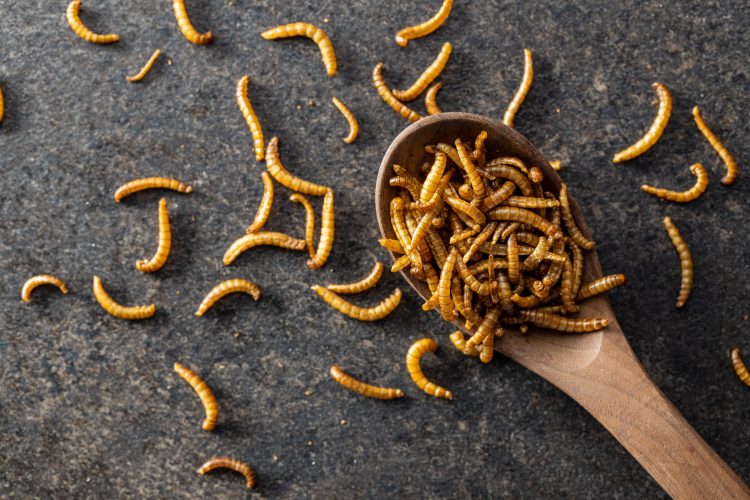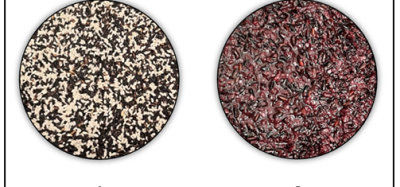Mealworm seasoning, sir?
- Like
- Digg
- Del
- Tumblr
- VKontakte
- Buffer
- Love This
- Odnoklassniki
- Meneame
- Blogger
- Amazon
- Yahoo Mail
- Gmail
- AOL
- Newsvine
- HackerNews
- Evernote
- MySpace
- Mail.ru
- Viadeo
- Line
- Comments
- Yummly
- SMS
- Viber
- Telegram
- Subscribe
- Skype
- Facebook Messenger
- Kakao
- LiveJournal
- Yammer
- Edgar
- Fintel
- Mix
- Instapaper
- Copy Link
Posted: 24 August 2022 | New Food | No comments yet
Insects are beginning to become more accepted as a food source, but researchers from South Korea are taking things a step further in a bid to integrate insect protein even further in our diet.


Beetle larvae, such as mealworms, are often considered to be creepy, crawly nuisances. But these insects are edible and could be a healthful alternative to traditional meat protein sources.
But researchers have reported that they’ve cooked up mealworms with sugar, creating a “meat-like” flavouring, and claim it could someday be used in convenience foods as a tasty source of extra protein.
“Recently, eating insects has become of interest because of the increasing cost of animal protein, as well as the associated environmental issues,” said In Hee Cho, PhD, the project’s principal investigator.
Insect-based food gets green light as EFSA approves mealworms
The global population is expected to reach 9.7 billion people by 2050 and nearly 11 billion by 2100, according to the United Nations. Feeding them all with animal meat — especially cows, pigs and sheep — will require larger amounts of food, water and land resources. In addition, cows are a substantial contributor to climate change, releasing copious amounts of methane in their burps. So, more sustainable sources of protein are needed.
“Insects are a nutritious and healthy food source with high amounts of fatty acids, vitamins, minerals, fibre and high-quality protein, which is like that of meat,” said Cho, whose team is based at Wonkwang University (South Korea).
But mealworms suffer from an image problem, she says.
In many parts of the world, eating insects isn’t common, and people can be squeamish about consuming them. Although some companies are trying to change people’s minds by selling cooked whole mealworms as crunchy, salty snacks, consumer acceptance is not widespread. Cho says that to get more people to regularly eat mealworms, a sneakier approach might be in order — hiding insects in the form of seasonings inside easy-to-cook and other convenience products.
The research team’s first step was to understand this insect’s flavour profile. They compared mealworm aromas throughout its lifecycle, from egg to larva to pupa to adult. While there were some differences in the individual compounds, all of the stages primarily contained volatile hydrocarbons, which evaporate and give off scents. For example, raw larvae had wet soil-like, shrimp-like and sweetcorn-like aromas.
Then Hojun Seo, a graduate student on Cho’s team, compared the flavours that developed as larvae were cooked with different methods. Steamed mealworms developed even stronger sweetcorn-like aromas, whereas roasted and deep-fried versions had shrimp-like and fried oil-like attributes. According to Seo, the flavours compounds from roasting and frying included pyrazines, alcohols and aldehydes, and were similar to the compounds formed when meat and seafood are cooked.
Based on these results, the team expected that additional reaction flavours could be produced from the protein-rich mealworms if they were heated with sugar. Reaction flavours, sometimes called process flavours, are produced when proteins and sugars are heated together and interact, for instance, through Maillard, Strecker and caramelisation reactions and fatty acid oxidation, says Cho. The result is usually a suite of “meat-like” and savoury flavours.
The team then took the samples to a panel of volunteers to provide feedback about which had the most favourable “meat-like” odour. “As a result of this study, 10 of the reaction flavours were optimised based on consumer preferences,” said Hyeyoung Park, a graduate student in Cho’s lab.
The research team hopes that these results will contribute to the commercial development of meat-like and savoury flavourings and seasonings, and will encourage the convenience food industry to include edible insects in their products.
Related topics
Ingredients, Insect Protein, New product development (NPD), Product Development, Research & development, retail, Technology & Innovation









